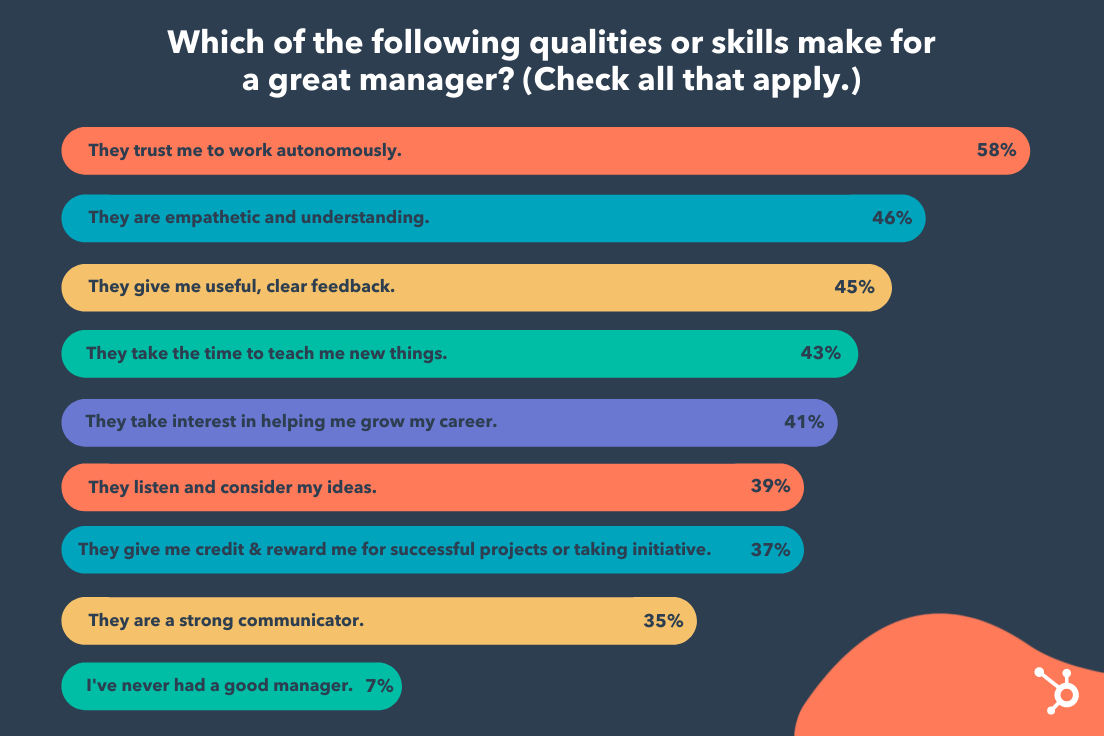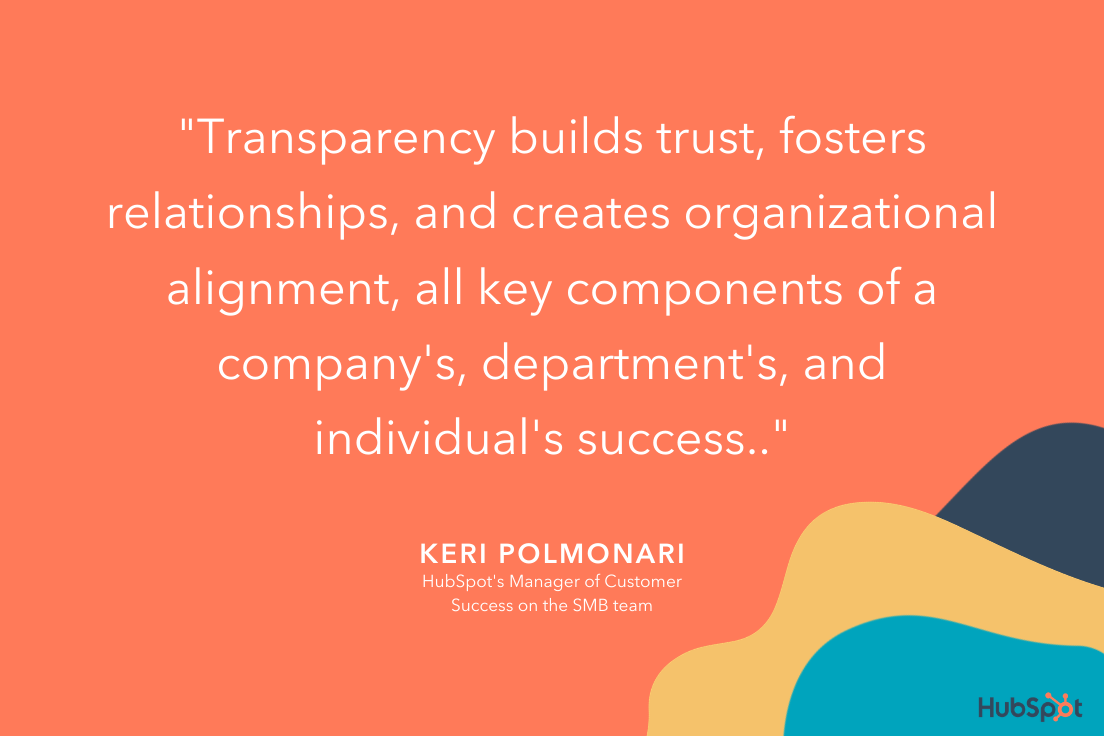Why do people really quit their jobs?
Before you say “salary,” “benefits,” or “workload,” take a second to think about the worst boss you’ve ever had.
Were they bad at giving feedback, not helpful, or just plain mean? Did they have you feeling unmotivated, too nervous to offer ideas, or fearing that you’d lose your job with the slightest miss-step?
Once you let those memories sink in, you probably won’t second guess the statement: “People quit their managers, not their jobs.”
Over the years, this fact hasn’t changed. Study after study has emphasized that companies need good managers to retain good employees.
But what makes for a good manager? And what skills or strategies can you develop to ensure you’re considered a good one?
To explore this issue, we polled people and asked them to check off all the qualities they felt were most important for a great manager.
 Recipients listed “they trust me to work autonomously”, “They are empathetic and understanding”, and “They give me useful, clear feedback”, as the three most important qualities a good manager needs to have.
Recipients listed “they trust me to work autonomously”, “They are empathetic and understanding”, and “They give me useful, clear feedback”, as the three most important qualities a good manager needs to have.
Along with this data, I consulted my colleagues to get their thoughts on what makes a people manager effective. Regardless of whether you’re interested in managing a team, or just want to know if a prospective boss is actually a good manager, here are 7 crucial qualities of a great team leader.
7 Skills People Managers Must Master, According to HubSpot Employees
1. Good managers help employees navigate change.
Consider the last time you experienced change within your organization. Maybe a beloved leader retired, or perhaps your team experienced a reorg. Maybe you even acquired a new company.
Whatever the reason, I’m willing to bet the change felt daunting at times. Fortunately, good managers can mitigate the negative or ambivalent emotions that arise from change.
For instance, Christine McLaughlin, a Senior Project Manager on HubSpot’s Sales Leadership Enablement team, told me: “The strongest managers are ones who can help their teams navigate change in a very personal way. I’m a firm believer that every challenge presents an opportunity. But, because we’re human, we can’t always see the opportunity from the start.”
McLaughlin adds, “Our personal life, mental health, physical health, the last meeting we had, the next meeting we’re preparing for, all play a role in influencing how we perceive change. Do we view it as a challenge? An opportunity? A setback? A relief?”
“Strong managers can translate change for each individual on their team. They meet their teammate where they’re at and help to answer their questions and concerns to bring them to where they need to go.”
So … how can you do this? Start by fostering psychological safety, so your employees feel comfortable mentioning how they feel about a certain business change. Then, listen carefully to their concerns and work on providing solutions for those issues.
For instance, let’s say your team has experienced a reorg and one of your direct reports is concerned her role is going to change as a result.
To mitigate those concerns, consider creating a document that outlines which (if any) of her responsibilities might change as a result of the reorg — along with some new opportunities she can pursue to continue developing her professional skills.
2. Good managers are open and transparent.
Trust and transparency are undeniably critical components of good leaders — and, post-pandemic, this is continuing to rise in importance. In fact, Edelman’s most recent 2021 benchmark barometer on trust in leaders found employees ranked “good employee communication” 44 points higher than in the previous year.
Keri Polmonari, HubSpot’s Manager of Customer Success on the SMB team, believes transparency to be one of the most important attributes a good leader can possess.
She says, “Being transparent and forthcoming with your team creates an open and honest dialogue and ensures everyone is on the same page. Business changes — like changes in department goals, processes, or personnel — can be difficult and overwhelming. [But] when everyone understands the why behind these business changes, they are more open and understanding of implications this could have on their jobs, both positive and negative.”
Polmonari says,”Transparency builds trust, fosters relationships, and creates organizational alignment, all key components of a company’s, department’s, and individual’s success.”

3. Good managers encourage vulnerability.
Consider the last time your manager started your 1:1 with a slightly more personal question, like, “How was your birthday this past weekend?” or “Read any good books lately?”
These questions ultimately help encourage vulnerability by creating space for you to share information about your life outside of work — and they can go a long way towards creating stronger bonds.
As Jill Callan, VP of Marketing at Trusted Health, told me, “Whenever I start a new role or inherit a new team, I begin by enabling and encouraging vulnerability. This helps me forge strong bonds with my direct reports and allows them to be comfortable to share ideas and admit weaknesses.”
Callan adds, “I’m also very intentional about getting to know my team as individuals, and learn about their lives outside of work. Taking the time upfront to build a strong, authentic relationship with my direct reports helps us tackle inevitable tough challenges down the line.”
To encourage vulnerability, consider how you might increase your own openness with your team. For instance, perhaps you admit when you’re feeling overwhelmed with childcare duties, mention a Netflix show you’ve been binging, or simply chat about the gardening hobby you’ve picked up.
And embrace vulnerability by admitting when you’ve made a mistake or you’re feeling overwhelmed — it will help your employees feel comfortable admitting the same.

4. Good managers find ways to supplement their team member’s weaknesses.
I once had a manager who repeatedly sought out learning and development opportunities for the areas we’d determined as weaknesses of mine. She would often email me public speaking courses, or data & analytics workshops.
As a result, I continued to grow professionally, and I felt challenged. This is what a good manager does: Continues to keep a direct report’s weaknesses in-mind, and provides guidance to help that employee improve.
HubSpot Senior Manager Christina Perricone concurs, telling me, “Good managers find ways to supplement their team member’s weaknesses. Each of us has skills that come naturally to us, as well as skills we’re not so great at.”
“An attuned manager can identify an individual’s weak areas and will surface resources or offer guidance to assist in those areas.”
Consider how you might similarly foster growth by taking stock of your team’s weaknesses, and actively pursuing resources that can help your team develop their weaker skills.
Additionally, use the hiring process to create a more well-rounded team by identifying strengths and weaknesses of existing employees.
As Perricone says, “Good managers are skilled at balancing out their teams by recruiting talent that can fill in the skill and experience gaps, thereby creating a more well-rounded unit.”
5. Good managers work for their employees — not above them.
You might be thinking, “Managers work for their employees? Isn’t it the other way around?”
Actually, a manager, like an employee, is more effective when they’re an active team player.
But, while an employee’s job is to fulfill tasks within a job description, a manager’s job is to make his or her team successful. To do this, a manager shouldn’t be afraid to chime in during meetings, assist on projects, or help their team grow or succeed in other ways.
For instance, consider asking your direct reports during a 1:1, “Is there anything you need me to do?”
This question can be translated in multiple positive ways, including, “Are there any blockers I can remove for you?”, “Are you waiting on a decision from me on anything?”, “Are you working on an idea that you want to share with me?” or even, “Is there something going on in your world outside of work that’s competing for your time and attention?”
Ultimately, a good manager considers it her primary job to make her employees successful in their projects and careers.
6. Good managers are always aiming to improve their emotional intelligence.
Emotional intelligence — or the skill that requires you to understand your own emotions, learn how to manage them, and know how to respond to the emotions of others on your team — is a vital component of good leadership.
Emotional intelligence can help you ensure you’re giving clear directions, and allows you to be empathetic to the needs of others. In short, it can help you foster stronger professional relationships and communicate effectively.
Most importantly, emotional intelligence enables you to stay calm during high-stress or unexpected situations — which can prevent you from making rash decisions as a leader, or stressing your team out unnecessarily.
7. Good managers can establish and promote psychologically-safe environments.
The ability to cultivate psychological safety is a critical asset that Jennifer Stefancik, a HubSpot Academy Marketing Manager, values in her own people manager.
“Feeling supported, heard, and understood is the foundation I need to be able to come to work every day with the right mindset to do good work,” Stefancik says.
Stefancik adds, “Genuine empathy and psychological safety are hard to fake, and it’s something that I think everyone should master before they consider the people management path.”
Psychological safety fosters innovative thinking and the ability to adapt well to change — and yet, according to a 2020 McKinsey Global Survey, only a handful of business leaders often demonstrate the behaviors associated with psychological safety.
If you’re a manager or hoping to be a better leader, it’s important you take time to identify aspects of your management style or overall office culture that could benefit from psychological safety.
For example, rather than using language that makes your team members feel scared of missing deadlines or goals, keep an open and supportive dialogue with them so they can confidently come to you with successes, learnings from failure, or concerns while they’re working on high-pressure projects.

Alternatively, if a team member is having trouble with a project, you should offer advice or assistance to help them remove blockers, rather than telling them to just get it done.
Supportive communication with team members allows them to learn from mistakes and grow as employees, rather than work tirelessly on projects because they fear that they’ll lose their jobs.
How to Be a Good Manager
As outlined in the data above, there are a few key traits required of any good manager. These include:
- Providing coaching and mentoring when necessary, but enabling your team to work autonomously and trusting them to get the job done.
- Showing empathy towards your direct reports as people with lives outside of work, and creating a sense of psychological safety for your employees to feel comfortable admitting when they’re struggling or need help.
- Being clear and direct with feedback.
- Taking the time to go the extra mile to help foster your employees’ professional growth through trainings, learning & development opportunities, or 1:1 sessions in which you coach them on certain skills.
However, a good manager looks different depending on the department or role — a good sales manager, for instance, requires different skills than that of a good marketing manager. Let’s dive into those, now.
How to Be a Good Sales Manager
Being a good sales manager requires a few unique skills outside of those listed above.
Along with setting clear expectations, communicating effectively, and inspiring your sales reps to perform at their best, a good sales manager needs to demonstrate a positive mindset, build team unity, and learn how to best support each sales rep in the unique way that will serve him or her best.
A few other notes on being a good sales manager:
- Use a dashboard or task management tool to easily track metrics for each sales rep. This enables you to avoid taking up too much time in your meetings discussing metrics — instead, you can now use that time to identify how you can best help, support, and coach your reps.
- Plan team outings or events that allow your team to build relationships with one another. Sales can be high-pressure and stressful, so it’s important you provide dedicated time to enable your sales reps to connect with one another and feel that they’re part of a support system.
- Look for trainings and development opportunities so your sales reps can continue to improve. In 1:1 meetings, focus on how you can help them achieve their goals; in team meetings, figure out what types of trainings can help the entire team perform better.
- Motivate your team by focusing on the ‘bigger purpose’ to ensure they feel intrinsically motivated. Sales isn’t just about hitting quota and making money — it’s also (oftentimes) about selling a product or service that can help people in large or small ways. Remind your team of your company’s bigger purpose to ensure they feel fulfilled and motivated.
Looking for more sales manager tips? Take a look at Here’s What Sales Leaders Should Prioritize in 2021 According to a Sandler Expert or 10 Things I Wish I Knew Before Becoming a Sales Manager.
How to Be a Good Marketing Manager
Marketing managers are often in-charge of leading a team, but they’re typically also responsible for a content property or program, which means their tasks can vary greatly.
Here are a few skills of a good marketing manager:
- The ability to think big-picture; using metrics and data to create a strong long-term strategy, and knowing when to pivot when an existing strategy isn’t working out as expected.
- Communicating effectively with various stakeholders — this includes inspiring and motivating your direct reports, communicating team goals cross-functionally and to leadership, and creating clear external communications, as well.
- Delegating and organizing tasks effectively. Learn about your direct report’s strengths, interests, and areas for growth, and facilitate that growth by giving them projects when they align with their interests. This doesn’t mean handing off any unwanted tasks from your to-do list — if you find a project that aligns with your direct report’s interests and you feel it’s mutually beneficial with team goals, then you’ll want to shuffle some of their existing tasks to ensure you don’t burn your team out.
To learn more about managing a marketing team, take a look at What Is a Marketing Manager?
How to Be a Good Project Manager
To be a good project manager, you need a few additional technical skills compared to the other managers in this list. Project managers need a deep technical understanding of the project at-hand in order to understand which tasks need to be assigned to whom, and to keep the process running smoothly.
A few other project manager skills and responsibilities include:
- Being able to set realistic goals, and understanding what resources are required. A project manager needs to be able to set timelines on certain aspects of a project, and she also needs to understand what resources — including employees, external consultants, tools, or budgeting — are required to make it happen.
- Having good organization and communication skills. A good project manager needs to remain organized and detail-oriented in order to effectively delegate tasks to the right teams, and stay on-top of identifying what needs to happen next for the project to go smoothly. A good project manager also needs to be able to clearly articulate the full scope of a project to various stakeholders to ensure each team is aligned on bigger-picture strategy.
- Analyzing and determining potential risks. A good project manager needs to be able to foresee potential roadblocks in any given project, and analyze either internal metrics or industry data to determine the best way to mitigate those risks.
A good project manager also uses the best tools at his or her disposal to create a streamlined process, keep track of responsibilities and timeline, and delegate effectively. Take a look at 16 Free Project Management Software Options to Keep Your Team On Track to choose the best tool for your needs.
And that’s it! You’re well on your way to become a better manager yourself. Remember, like any other role, becoming a good manager requires time, patience, dedication, and a consistent desire for feedback from your direct reports to iterate and grow over time.
![]()

![→ Click here to download leadership lessons from HubSpot founder, Dharmesh Shah [Free Guide].](https://i4lead.com/wp-content/uploads/2021/06/4e634041-e1ce-4a85-8e65-aea12fc10b84-1.png)
